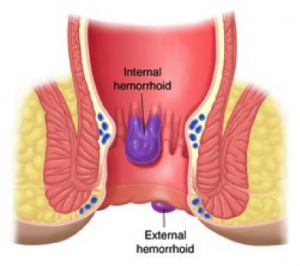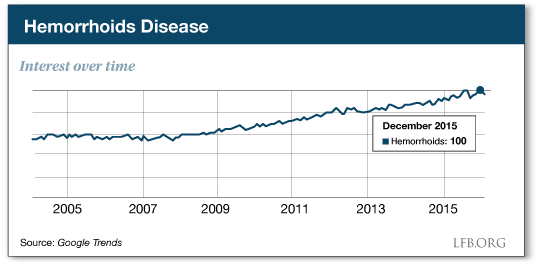
Did Hemorrhoids Take Down the French Empire?
- Napoleon’s struggle with a well-known medical condition may have rendered him useless to his army
- 75 percent of all people may find themselves enmeshed in a battle with this uncomfortable condition during their lifetime
- Don’t let pain and discomfort change the course of your history. Find out how to prevent it with these easy tips
Dear Reader,
Picture it.
It’s a warm June day in Europe. You can feel the pounding of horse hooves shaking the ground beneath you and smell the cannon fire hanging in the air. You sink deeper into sullen feelings as you hear the sounds of swords making contact and men screaming as they meet their fate on the battlefield. You are forced to lie paralyzed by great pain in your commander’s tent — knowing you are in too much pain to help your army as they continue to battle the British and Prussian armies.
Suddenly, a high-ranking French officer bursts into your tent and demands you mount your horse and go survey the battlefield.
“We need you out there! It’s the only hope we have to win, sir!” he screams.
You try to stand up. But, you fall right back down. The pain, burning, bleeding, and itching are just too intense for you to go on. As you lie in the tent, you know that you have lost not only this battle, but your reign as emperor of France.
In this scenario, it’s June 18, 1815, and you are Napoleon Bonaparte. You have just succumbed to defat in the Battle of Waterloo.
And the reason why you couldn’t mount your horse to survey the battlefield? Or help your men stave off the advances of the enemy? Or defend your title as the emperor of France?
Because your body is already at war. And not with opposing military forces, but with a hellacious bout of hemorrhoids (also called piles).
That’s right. According to some historians, Napoleon may have lost the Battle of Waterloo due to an extreme case of piles.2

An accurate portrait of Napoleon at Waterloo — standing while in visible pain.
Photo Credit: sainthelenaisland.info
It’s pretty shocking to think such a common, slightly embarrassing condition may have changed the course of history.
But when faced with the fact that 75 percent of people will suffer from hemorrhoids at some point in their lives, it doesn’t seem so far-fetched.2
Today, Living Well Daily is going to lead your through the facts about hemorrhoids. We will discuss what hemorrhoids are, how they are formed, and, most importantly, how to prevent them from becoming your personal Battle of Waterloo.
![]() The Battleground in Your Body
The Battleground in Your Body
Have you gone to the bathroom and found blood in the water when you’re done? Or experienced itching, burning, pain, and pressure of the rectum?
These are the common symptoms of hemorrhoids. And if none of this sounds familiar now, as I mentioned above, you have three in four chance of experiencing at some point in your life.
If you are over age 50, there is a one in two chance that you already have.2
You may be wondering by now: What exactly are hemorrhoids? Let me explain…
Located just under the lining of the bottommost portion of the anus and the rectum, there is a network of soft veins. When these veins become enlarged and inflamed (usually cause by pressure), it creates a hemorrhoid. Hemorrhoids come in two different varieties, internal and external.

Figure 1 Photo credit: webnat.com
Internal hemorrhoids happen in the lower rectum. While internal hemorrhoids are typically painless, they can produce bleeding than can be seen in the toilet bowl on or on toilet paper after a bowel movement. However, if an internal hemorrhoid becomes prolapsed (when the vein protrudes beyond the anus) it can cause irritation or itching at the site.3
External hemorrhoids can cause pain because they develop under the skin near the anus. In fact, this type of hemorrhoid compromises the skin and causes irritation, and sometimes results in a blood clot. If a blood clot forms, it can cause extreme pain along with a lump close to the anus.3 If Napoleon did have hemorrhoids, it was likely this type.
Hemorrhoids can be caused by any type of added pressure on your blood vessels. This includes actions like straining you muscles during bowel movements, pregnancy, obesity, sitting for long periods of time on the toilet, and improper diet.
And while hemorrhoids already disrupt the lives of over 10 million Americans at any given time, Google Trends indicate this number could be increasing.

America’s interested has almost doubled over the last 10 years.
When I did a trend search, I found that Google searches for “hemorrhoids” has come close to doubling in the last 10 years.
In fact, hemorrhoids was the most searched health term on Google from 2012–2014.4
While factors like growing computer use and competency may play a role in this climbing number, it may also indicate that lots of cases of hemorrhoids going unreported.
The rapid increase in obesity may also be to blame here. Extra weight on the body can result in restricted blood flow and increased pressure on blood vessels. This added pressure can compromise vein strength and cause the veins to erupt. Obesity is also linked to sedentary lifestyle, poor eating habits, low levels of physical exercise, and irregular bowel movements, which is the main source of hemorrhoids growth.5
Even though it may seem inevitable that you will experience your personal Battle of Waterloo with hemorrhoids, there are a few ways to keep them at bay.
Exercising for 20–30 minutes a day may help stimulate regular bowel movements, which can be helpful in the battle against hemorrhoid development.
Another preventative measure against hemorrhoids is collagen. A study published in Colorectal Disease found that patients suffering from hemorrhoids have significantly reduced collagen ratios compared with those without hemorrhoids.6
Because collagen may help to support vein repair, adding a collagen supplement may be a good defense tactic in your battle against hemorrhoids.7
It’s important to note that hemorrhoids symptoms may sometimes be indicators of more serious conditions like colon cancer and irritable bowel disease. Be sure to contact your health care provider if you experience any blood in your bowel movements or any changes in your digestive health.
If Napoleon had only know hemorrhoid prevention and was so easy, perhaps we would all be reading this article in French.
If you have any natural hemorrhoid hacks, tell me about them! Nmoore@lfb.org
Live well,

Natalie Moore
Managing editor, Living Well Daily
Sources
[1] 7 Things You May Not Know About the Battle of Waterloo
[2] Hemorrhoids
[3] Hemorrhoids and what to do about them
[4] Eliminating Hemorrhoids Once And For All
[5] Obesity And Hemorrhoids: What’s The Connection?
[6] Haemorrhoids – a collagen disease?
[7] Linus Pauling’s Unified Theory of Human Cardiovascular Disease
Written By Natalie Moore
Natalie Moore is a dedicated health researcher with a passion for finding healthy, natural, and science-based solutions. After a decade of direct healthcare experience in western and natural medicine, she was involved in public health research before joining Living Well Daily.
View More Free Articles
Four Carbs that Could Add YEARS to Your Life
You’ve likely been avoiding carbs like the plague. Health gurus, fitness influencers, and diet books have convinced you that carbs are the enemy—that they spike your blood sugar, pack on pounds, and fast-track you to diabetes. So you’ve eliminated bread, sworn off pasta, and feel guilty just touching a piece of fruit. But what if...
Upgrade from Bananas and Apples to These Powerhouse Fruits
I’m often asked which fruits are the best. So, let’s talk about it. I’ll cut right to the chase: berries win this contest hands down. If you’re limiting your options to apples and bananas, you’re missing out on a universe of superior antioxidant power. Those everyday fruits are like bringing a knife to a gunfight...
The REAL Reason Americans are Getting “Fatter”
You’ve heard it a thousand times: “Americans are getting fatter because we’re lazy.” We sit at desks all day. We binge-watch Netflix instead of hitting the gym. We’ve traded physical labor for sedentary lifestyles. It’s a tidy explanation for why obesity has skyrocketed in developed countries. There’s just one problem—it’s completely wrong… A groundbreaking Duke...
Mailbag: Room Won't Stop Spinning? Do THIS First
“I’m dealing with vertigo issues, lightheadedness, and dizziness. As recently as this last Saturday I had multiple occurrences throughout the day. Is there anything I can do for this? I’m 69 and in good health. I work out 4 to 5 times a week.” —Spinning Hi Spinning, When patients approach me with similar complaints, I...
Hidden Number Secretly Sabotages Male Performance
Guys (and gals that love them), we should talk. You know how we’ve always been told that bedroom troubles are just part of getting older—that we just need to live with them? Well, it turns out that’s not true. Scientists recently wrapped up a six-year study that followed over 100 healthy men, and the findings...
Shocking Study Links Kids' Snacks to Dangerous Early Puberty
Kids are growing up in a world vastly different from the one we knew. Back in our day, if a child wanted something sweet, it was a piece of candy or a homemade cookie. Today’s kids are surrounded by products filled with artificial sweeteners that didn’t even exist when we were raising our own children....
Outdated Vitamin Guidelines Put Your Brain at Risk
If you’re like most people, you probably don’t think twice about vitamin B12—until your doctor mentions it during a routine blood test. But new research published in the Annals of Neurology suggests we need to pay closer attention to this crucial nutrient—especially as we age. Turns out, current guidelines for this essential nutrient might be...
The TRUTH About Supplement "Liver Dangers" REVEALED
There’s been a lot of buzz lately about liver damage from supplements—so, let’s talk about it. Reports of supplement-induced liver injuries have some folks wondering, “Could my natural remedy actually be harming me?” But before you toss all your supplements in the trash, let’s separate fact from fear—and talk about how to use supplements safely....
The 10,000 Steps LIE That's Ruining Your Health
I’ll be honest—I’m a little sick of the 10,000-steps theory. You know, the one that insists you need to take at least that many steps daily to stay healthy? You won’t believe where that claim originally came from. The 10,000-steps theory wasn’t handed down from the fitness gods on stone tablets. It originated from a...
“Brain Games” Failed You? Try THIS For Better Memory Instead
You know all those brain-training apps, supplements, and “miracle” memory-boosters that promise to keep your brain sharp as you age? Here’s the truth… There IS evidence they support brain health—and that’s why I’ll be the first to recommend them. But they aren’t the most powerful brain-boosting tool available to you. Another surprising solution has earned...









